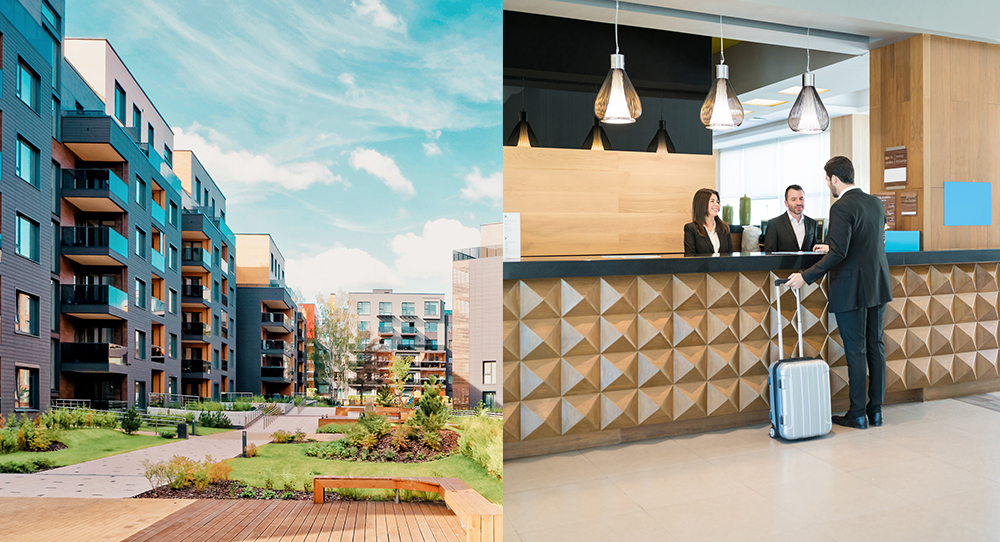When it comes to extended travel there are several options available to visitors in need of a place to stay. Two of the most common temporary housing options are hotels and corporate housing.
While these hospitality industries provide many similarities, like shelter and amenities, there are several differences that make each housing option a better choice for different travelers.
As a corporate housing staple in the Midwest for over 30 years, Viciniti has helped direct thousands of clients to corporate housing apartments or to traditional or extended-stay hotels depending on their needs.
When making this decision, clients often have similar questions about how each temporary housing option compares.
Here are the 5 most important things to look at when choosing between staying in a hotel or corporate apartment.

1. Cost
When you need a hotel for an upcoming vacation, price is probably one of the most important factors when shopping for your accommodations. That doesn’t change when looking for a place to stay for longer visits.
Traditional Hotels
If you’re considering a traditional hotel for your extended travels, your hotel room will generally cost you an average of $180 per night, depending on a number of factors including:
• Location
• Amenities
• Room Style
• View
This does not include additional costs commonly found in hotels such as parking fees or room service, though these added fees can sometimes be avoided, if at the cost of convenience.
Extended-Stay Hotels
Extended-stay or weekly hotels are generally the cheapest long-term housing option available, although there are several reasons this style of temporary housing is able to achieve such a low price point.
Averaging $61 per night, weekly hotels are the most budget-friendly extended stay option. The same factors that drive higher prices in some traditional hotels also have the same effect in extended-stay hotels.
The typically lower cost of an extended-stay hotel does come with some concessions that you should be aware of, as we’ll discuss later in this article.
Corporate Housing
Corporate Housing offers a similar price point to traditional hotels. At an average of about $109 per night, guests can stay in a corporate apartment in their desired city at a lower cost then they’ll find in a traditional hotel.
Similarly to both styles of hotels, a number of factors like location and amenities will make a corporate apartment in one community more costly than a unit in another apartment complex.
Also like traditional hotels, additional costs may be found in corporate housing. Primarily, housekeeping is generally an added service when staying with a corporate housing provider, while parking is almost always included with your nightly rate.

2. Length of Stay
One major difference between each form of temporary housing is the length of stay each type commonly caters to.
Traditional Hotels
Traditional hotels cater more often to short-term travelers. Most aspects of traditional hotels revolve around a daily schedule. Daily housekeeping, check-in and check-out times, and breakfasts are common benefits provided by traditional hotels on a daily basis.
This focus on short-term stays is taken to a new level at resort-style hotels, where beach or attraction access is given on a daily basis.
Extended-Stay Hotels
Operating as a sort of in-between for traditional hotels and corporate housing, extended stay hotels almost always cater to travelers on a weekly basis, leading to these temporary housing options being known as “weekly hotels” to many in the United States.
Extended-Stay hotels focus on travelers staying in weekly intervals in a number of ways, including:
• Weekly rates
• Weekly housekeeping
• Weekly continental breakfasts
Some weekly hotels do offer daily housekeeping and continental breakfasts in an effort to provide guests a higher level of service.
Corporate Housing
Conversely to the short-term stays of traditional hotel guests, corporate housing providers offer their services primarily for travelers staying for 30+ nights. Catering to these longer-stay clients, the apartments provided by corporate housing companies are designed for long stays, as they are identical to those rented to residents to live in on more permanent bases.
There are several amenities that help provide a more stress-free stay for corporate housing guests, including amenities like free parking and weekly, bi-weekly, or monthly housekeeping options. Keep reading to learn more about these factors that help create a homier touch over other hospitality options.

3. Simplicity
The size of the living space is another area where each temporary housing option offers something different.
Traditional Hotels
Traditional hotels offer the smallest living space of the three temporary housing options, with the average size of rooms reaching only 280 square feet. Inside a typical hotel room, you’ll find a space for sleeping, working, and relaxing all in one room.
Often the bathroom will be a separate room with the sink either in the room or just outside.
Traditional hotels usually offer the basics for shelter in a compact space, with no kitchen or separate work or lounge space. Suite style or upgraded rooms may offer these facilities, but you’ll need to pay extra to stay in these rooms.
These hotels are perfect for the guests they cater to, short-term travelers who don’t need more room.
Extended-Stay Hotels
The next largest temporary housing option is the extended-stay hotel. With average room sizes reaching 365 square feet, weekly hotel rooms are slightly larger than their short-stay counterparts. This additional space is often taken up by a small kitchenette and a slightly larger multi-use room.
In this kitchenette, you’ll commonly find a small sink and microwave, as well as a refrigerator and even a small cooking surface in some hotels.
Corporate Housing
Corporate apartments are, more often than not, quite larger than either of the two hotel options for travelers. These apartments are, on average, 750 square feet, offering several rooms for the various functions of a home.
With a full kitchen, laundry room, bedroom and living room, corporate housing apartments offer a complete home that’s perfect for long-term travelers. Corporate apartments can range anywhere from studio apartments to 3-bedroom homes, allowing enough space for the whole family to stay in the same unit.

4. Amenities & Features
No discussion about hospitality is complete without touching on amenities. These luxuries can make all the difference in a traveler’s choice of where to stay. All hospitality types share many types of amenities with the others, although each provides a unique set of luxuries you won’t find with any other.
Traditional Hotels
Depending on where you’re staying, traditional hotels can offer the most amenities of any of the hospitality providers. This is especially true when staying at a resort-style hotel.
Commonly, traditional hotels offer amenities like:
• Swimming Pools
• Business Center
• Fitness Center
• Housekeeping
• Breakfast/Restaurant Access
Resort hotels include all this and more! With added luxuries like spas, night clubs, and even water parks, these traditional hotels offer the most grandiose amenities of all hospitality options.
Extended-Stay Hotels
In keeping with their budget-focused business model, extended-stay hotels offer the most basic amenities.
Similar to traditional hotels, you’ll find swimming pools, fitness centers, and housekeeping in most extended-stay hotels, though the quality of these amenities will be quite different from those you’ll find in either a traditional hotel or corporate housing.
Housekeeping services may be daily or weekly and most offer a continental breakfast during a guest’s stay.
And while most extended-stay hotels boast similar amenities to traditional-style hotels, the quality of the amenities is decidedly less than other hospitality options.
The swimming pools you’ll commonly find at extended-stay hotels are usually small rectangular or circular pools with no frills. Similarly, fitness centers and business centers tend to be small and only equipped with the essentials necessary to do a basic workout or copy a document.
Corporate Housing
When it comes to the quality of amenities, corporate housing generally offers luxuries on the same level as an up-scale traditional hotel. Resort-style pools, large fitness centers and resident lounges with free refreshments or entertainment are common.
Many corporate apartments also come with unique amenities not found in either hotel options. Bike storage, walking trails, on-site dog parks and attached garages are all amenities available when staying in several corporate apartments. Corporate apartments are also a guest’s only choice of the three hospitality options that includes in-unit washer/dryer so residents won’t need to take their clothes to a communal laundry room or laundromat.
Because these corporate housing options are located within apartment communities, basketball courts, sand volleyball courts, outdoor grills and fishing lakes are common recreation facilities available to guests staying with a corporate housing provider.
Whereas hotels offer housekeeping services as a part of your stay, corporate housing providers generally offer housekeeping as an additional service you can request. Housekeeping at corporate housing can be set up weekly, bi-weekly, or monthly depending on how frequently the guest wants their apartment cleaned.

5. Location
Finding the right location to stay in a new city can be tricky. Luckily hotels and corporate housing offer housing in a variety of neighborhoods in almost every city around the world. Each option does tend to gravitate to certain locales, however, so you may be better off looking at one option over another if you want to stay in one place or avoid another.
Traditional Hotels
If you’re looking to stay downtown or near the hottest attractions in your new city a traditional hotel may be the option for you!
These hotels often gravitate towards areas in a city that bring in a lot of visitors. This allows traditional hotels to cater to more short-term travelers looking to stay in these hot neighborhoods.
In larger cities with more attractions spread throughout the city, it may be easier to find hotels in other areas of town, giving you more choices for where to stay when in town.
Extended-Stay Hotels
Conversely to traditional hotels, weekly hotels tend to gravitate to the edges of the city away from the hustle and bustle of downtown areas.
As the typical extended-stay hotel guest plans to stay for a week to a month, these guests typically have a mode of transportation to reach any attractions in the city with ease that may or may not be found with traditional hotel guests.
Being further from the hot spots in town allows weekly hotels to keep their prices lower while sacrificing convenience for guests.
Corporate Housing
Because corporate housing utilizes apartment communities, this hospitality option generally offers a place to stay in most neighborhoods in a city.
This allows guests to personalize their stay based on their needs. If a resident prefers to stay in a quiet neighborhood, most corporate housing providers have numerous suburban apartments. If a guest prefers to be in the heart of an entertainment district, corporate housing can generally provide an apartment in these areas.
Additionally, many corporate housing companies can find an apartment that fits your needs for you, without you needing to know what areas are compatible with your wants in your new city. This service helps make corporate housing the most flexible hospitality option in regard to where you’re staying.
So Which is Right for You?
While each traveler has a different idea of what the perfect temporary home is for them, there are a number of criteria that each of the three hospitality options meet better than the others. Here’s a summary of the most important things to look at when making your choice of temporary housing.
• Cost
Traditional hotels cost, on average, $180 per night. This makes them the most expensive option, though they do provide high quality services to their guests. Extended-stay hotels offer the lowest-cost temporary housing of the three hospitality options at $61 per night. The average corporate housing price is $109 per night, making it more affordable than traditional hotels.
• Length of Stay
Traditional hotels generally cater to short-term guests staying no more than a few days while extended-stay hotels often serve guests staying on a weekly basis. Corporate housing providers often employ a 30-night minimum for residents staying with them, however it is common for these companies to overrule this minimum for guests staying less than 30-nights.
• Size
While traditional hotels are the most expensive option, they offer the least amount of space in their rooms. Averaging around 280 square feet, this makes traditional hotels smaller than their weekly hotel counterparts who operate at an average of 365 square feet. Corporate apartments offer the most space by far, averaging around 750 square feet.
• Services/Amenities
Traditional hotels can offer some of the highest-quality amenities such as resort-style swimming pools, daily housekeeping and in-house restaurants or bars. At an extended-stay hotel you’ll often find basic services like continental breakfast and a basic rectangular or circular swimming pool. Similar to a traditional hotel, corporate housing offers resort-style swimming pools, as well as unique amenities like in-unit laundry and attached garages, though housekeeping is considered an extra service that can be attained weekly, bi-weekly or monthly for a fee.
• Location
When looking at location, you’ll find traditional hotels gravitate towards downtown and entertainment, dining, and shopping districts around the city. Conversely, weekly hotels tend to reside on the edge of cities away from the hustle and bustle of downtown. Corporate housing tends to provide the most flexibility when it comes to location as corporate apartments can be found scattered through the city in the town’s hot spots and quiet suburbs.
Only you can decide which option fits your needs, but hopefully now you have the knowledge to make an informed decision about where to stay during your extended travels.
At Viciniti, we provide a completely custom experience for our corporate housing guests. When you stay with us, you can choose your apartment community or we can recommend options that fit your taste and location needs.
Our corporate apartments typically range in price from $104-$139 per night, making us an affordable option for your long-term stays throughout the Midwest. Every guest can earn Marriott Bonvoy points during their stay that they can use at over a thousand locations around the world.
Ready to get started? Contact us or view our properties to get started finding your perfect corporate apartment.
Want to learn more about corporate housing before you travel? Get an in-depth look into how much corporate housing costs and other common corporate housing questions in our blog.






